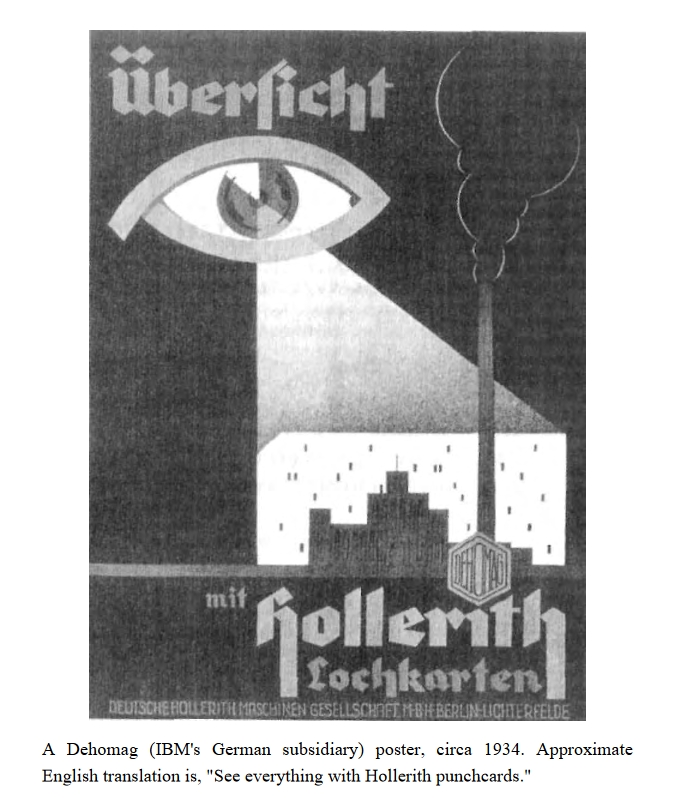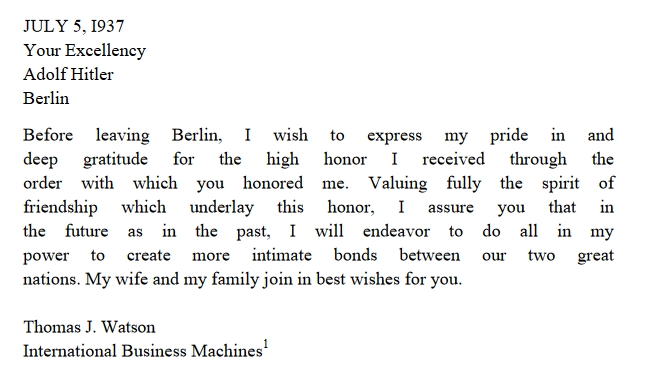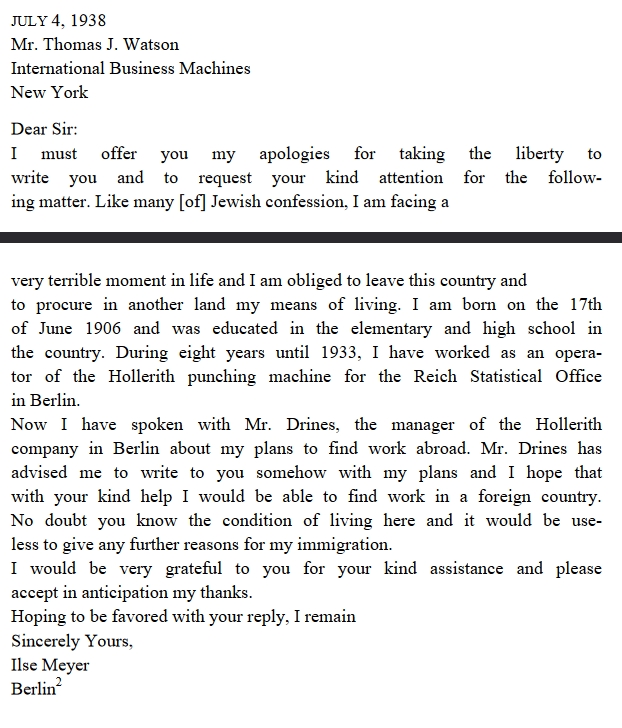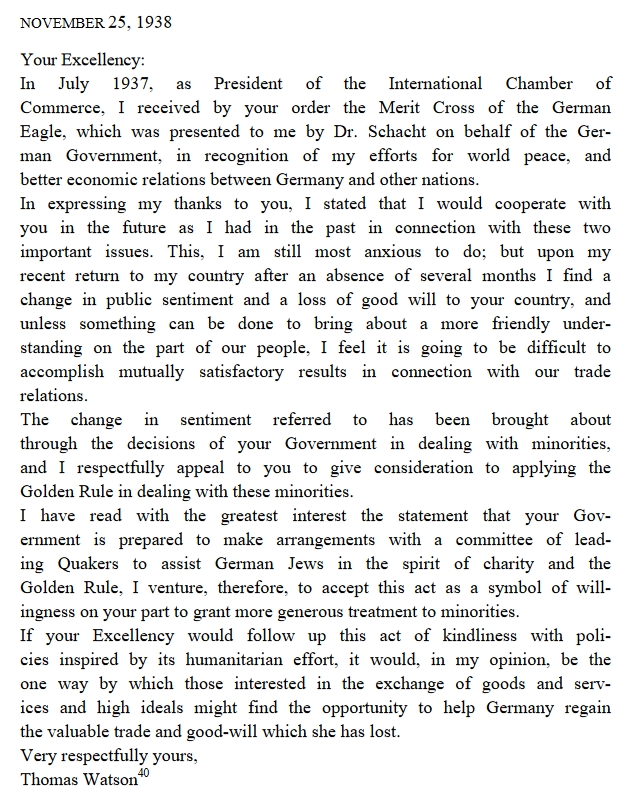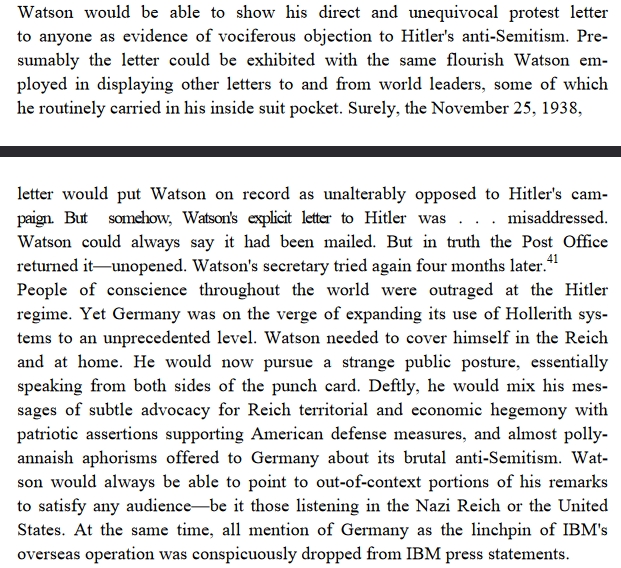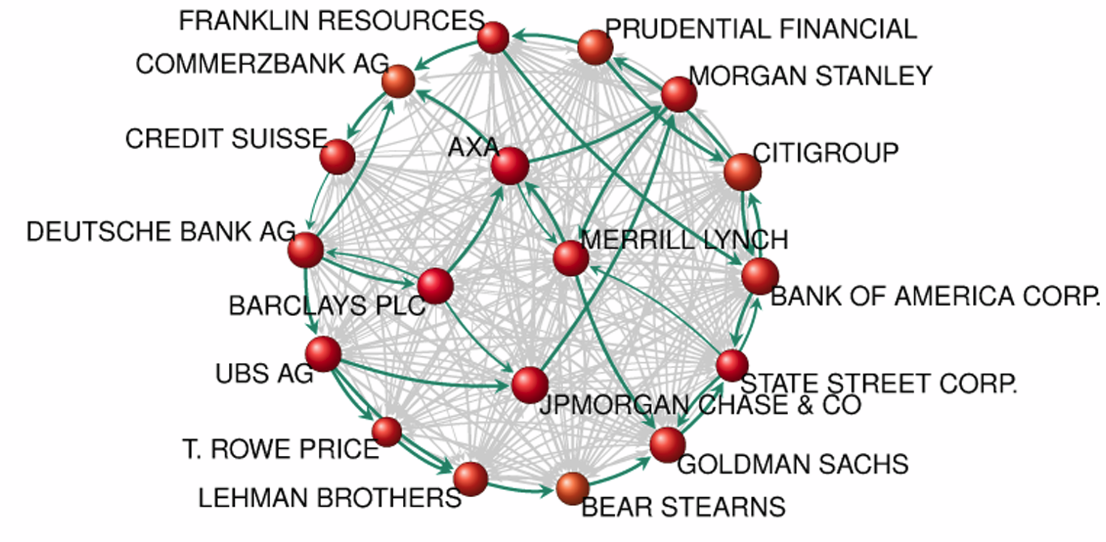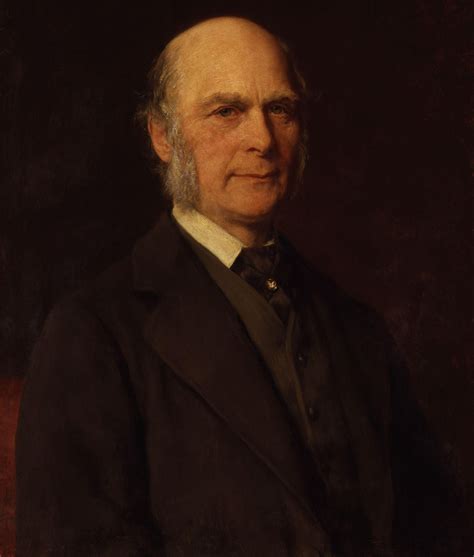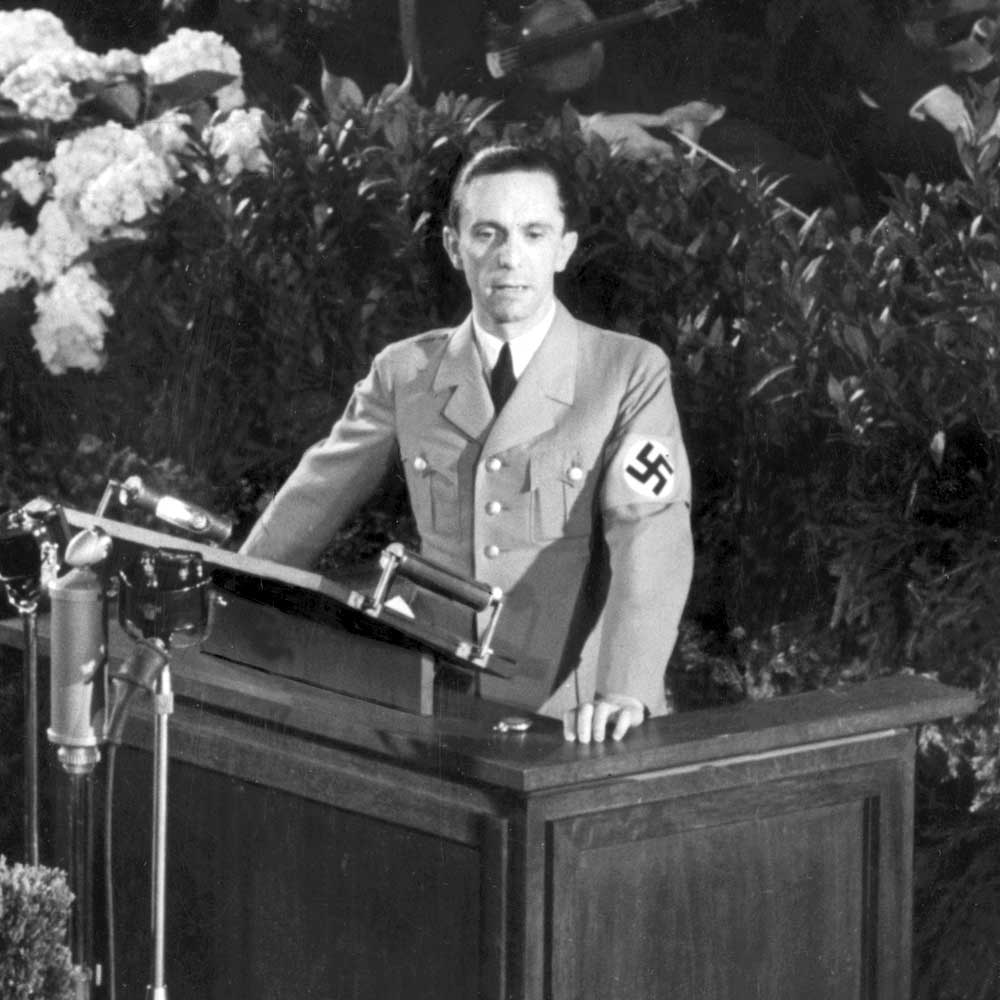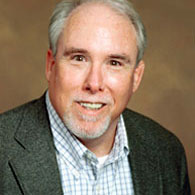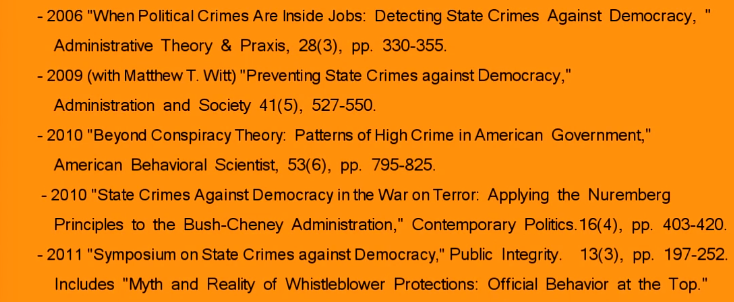See also: Edwin Black – IBM and the Holocaust: The Strategic Alliance Between Nazi Germany and America’s Most Powerful Corporation (2002)
***
In December 2023, IBM released Quatum System 2
***
Version 1
***
Benthams Panopticon

Further References
- Arendt, Hannah, Eichmann in Jerusalem: A Report on the Banality of Evil, New York:Viking Penguin, Inc., 1963; Penguin Books, 1965.
- Armanski, Gerhard, Maschinen des Terrors: Das Lager (KZ und GULAG) in der Moderne. Munster: Verlag Westfalisches Dampfboot, 1993.
- Austrian, Geoffrey D. Herman Hollerith: Forgotten Giant of Information Processing. New York: Columbia University Press, 1982.
- Baumgartner, Andreas. Die vergessenen Frauen von Mauthausen: Die weiblichen Haftlinge des Konzentrationslagers Mauthausen und ihre Geschichte. Wien: Verlag Osterreich, 1997.
- Barker, Kenneth, ed. The NIV Study Bible. Grand Rapids: Zondervan Publishing House, 1995.
- Belden, Thomas Graham and Marva Robins Belden. The Lengthening Shadow: The Life of Thomas J. Watson. Boston: Litde, Brown and Company, 1962.
- Berenbaum, Michael. The World Must Know. Boston: Litde, Brown and Company, 1993.
- Black, Edwin. The Transfer Agreement: The Dramatic Story of the Pact Between the Third Reich and Jewish Palestine. New York: Macmillan, 1984; Chicago: Dialog Press, 1999.
- Borkin, Joseph. The Crime and Punishment of I.G. Farben. New York: The Free Press, 1978.
- Bradsher, Greg, comp. Holocaust-Era Assets: A Finding Aid to Records at the National Archives at College Park, Maryland. National Archives and Records Administration, 1999.
- Breitman, Richard. Official Secrets: What the Nazis Planned, What the British and Americans Knew. New York: Hill and Wang, 1998.
- Browning, Christopher R. The Path to Genocide: Essays on Launching the Final Solution. New York: Cambridge University Press, 1992.
- Brynen, Rex. Sanctuary and Survival: The PLO in Lebanon. Boulder: Westview Press, 1990.
- Burleigh, Michael. Death and Deliverance: ‘Euthanasia’ in Germany,’ 1900-1945. New York: Cambridge University Press, 1994.
- Carmille, Robert. Des Apparences A La Realite: Mise au Point, Le “Fichier Juif”: Rapport de la Commission presidee par Rene Remond au Premier Ministre, 1996.
- Centre Historique des Archives Nationales. Inventaire des Archives du Commissariat General aux Questions Juives et du Service de Restitution des Biens des Victimes des Lois et Mesures de Spoliation. Paris: Centre Historique des Archives Nationales, 1998.
- Choldin, Harvey M. Looking for the Last Percent: The Controversy Over Census Undercounts. New Brunswick: Rutgers University Press, 1994.
- Clements, Bruce. From Ice Set Free: The Story of Otto Kiep. New York: Farrar, Straus and Giroux, 1972.
- Connolly, James. History of Computing in Europe. IBM World Trade Corporation, circa 1967.
- Cortada, James W Before the Computer: IBM, NCR, Burroughs, and Remington Rand and the Industry They Created, 1865-1956. Princeton: Princeton University Press, 1993.
- Dassbach, Carl H. A. Global Enterprises and the World Economy: Ford General Motors, and IBM, the Emergence of the Transnational Enterprise. New York: Garland Publishing, Inc., 1989.
- De Jong, L. Het Koninkrijk in de Tweede Wereldoorlog Vol. 3: Mai 1940, ‘s Gravenhage, 1970.
- De Jong, L. Holland Fights the Nazis. London: Lindsay Drummon.
- Encyclopaedia Judaica. Jerusalem: Keter Publishing House, 1972.
- van den Ende, Jan, Knopen, kaarten en chips: De geschiedenis van de automatisering bij het Centraal Bureau voor de Statistiek, Amsterdam, 1991.
- Engelbourg, Saul. International Business Machines: A Business History. Arno Press, 1976.
- Erwich, B. and J.G.S.J. van Maarseveen, eds., Een eeuw statistieken: Historisch-Methodologische schetsen van de Nederlandse officiële statistieken in de Twintigste eeuw, Amsterdam, 1999.
- Fein, Helen. Accounting for Genocide: National Responses and Jewish Victimization During the Holocaust. New York: The Free Press, 1979.
- Ferencz, Benjamin B. Less Than Slaves: Jewish Forced Labor and the Quest for Compensation. Cambridge: Harvard University Press, 1979.
- Foy, Nancy, The Sun Never Sets on IBM, New York: William Morrow & Company, Inc., 1975.
- Flint, Charles R. Memories of an Active Life: Men, and Ships, and Sealing Wax, New York: G.P. Putnam’s Sons, 1923.
- Friedlander, Henry. The Origins of Nazi Genocide: From Euthanasia to the Final Solution. Chapel Hill: The University of North Carolina Press, 1995.
- Friedlander, Saul. Nazi Germany and the Jews. Volume 1: The Years of Persecution. New York: HarperCollins, 1997.
- Garr, Doug. Lou Gerstner and the Business Turnaround of the Decade. New York: HarperCollins 1999.
- Gilbert, Martin. The Holocaust: A History of the Jews of Europe During the Second World War. New York: Holt, Rinehart and Winston, 1985.
- Goldhagen, Daniel Jonah. Hitler’s Willing Executioners: Ordinary Germans and the Holocaust. New York: Alfred A. Knopf, 1996; Vintage Books, 1997.
- Gutman, Israel. Resistance: The Warsaw Ghetto Uprising. New York: Houghton Mifflin Company, 1994.
- Gutman, Yisrael and Michael Berenbaum, eds. Anatomy of the Auschwitz Death Camp. Indianapolis: Indiana University Press, 1994; published in association with the United States Holocaust Memorial Museum, Washington, D.C.
- Haft, Cynthia J. The Bargain and the Bridle: The General Union of the Israelites of France, 1941-1944. Chicago: Dialog Press, 1983.
- Herzberg, Abel J. Between Two Streams: A Diary from Bergen-Belsen. Translated by Jack Santcross. New York: IB. Tauris.
- Hilberg, Raul, ed. Documents of Destruction: Germany and Jewry 1933-1945. Chicago: Quadrangle Books, Inc., 1971.
- Hilberg, Raul. The Destruction of the European Jews. New York: Quadrangle Books, Inc., 1961; Harper Colophon Books, 1979;
- Hilberg, Raul, Stanislaw Staron, and Josef Kermisz, eds. The Warsaw Diary of Adam Czerniakow; Prelude to Doom. Translated by Stanislaw Staron and the staff of Yad Vashem. New York: Stein and Day, 1979.
- Hirschfeld, Gerhard. Nazi Rule and Dutch Collaboration: The Netherlands Under German Occupation, 1940-1945. Translated by Louise Willmot. New York: Berg, 1988.
- Hoess, Rudolf. Commandant of Auschwitz: The Autobiography of Rudolf Hoess. Translated by Constantine FitzGibbon. New York: Popular Library, 1959.
- Ioanid, Radu. The Holocaust in Romania: The Destruction of Jews and Gypsies Under the Antonescu Regime, 1940-1944. Chicago: Ivan R. Dee, 2000.
- Jagendorf, Siegried. Jagendorf’s Foundry: A Memoir of the Romanian Holocaust, 1941-1944. New York: HarperCollins, 1991.
- Kahn, Annette. Le Fichier. Paris: Robert Laffont, S.A., 1993.
- Katsh, Abraham I., ed. and translator. Scroll of Agony: The Warsaw Diary of Chaim A. Kaplan. New York: The Macmillan Company, 1965.
- Katsh, Abraham I., ed. and translator. The Warsaw Diary of Chaim A. Kaplan. New York: Collier Books, 1973.
- Kermish, Joseph, ed. To Live With Honor and Die With Honor: Selected Documents from the Warsaw Ghetto Underground Archives “O.S.” [“Oneg Skabbath”] Jerusalem: Yad Vashem, 1986.
- Klee, Ernst. “Euthanasie” im NS-Staat: Die “Vernichtung lebensunwerten Lebens.” Frankfurt am Main: S. Fischer Verlag GmbH 1999.
- Kleine Chronik der IBM Deutschland, IBM Corporation, 1993.
- Kolb, Eberhard. Bergen-Belsen: From “Detention Camp” to Concentration Camp, 1943-1945. Translated by Gregory Claeys and Christine Lattek. Gottingen: Vandenhoeck & Ruprecht, 1985, 1986.
- Krausnick, Helmut, Hans Buchheim, Martin Broszat, and Hans-Adolf Jacobsen. Anatomy of the SS State. Translated by Richard Barry, Marian Jackson, and Dorothy Long. New York: Walker and Company, 1968.
- von Lang, Jochen, ed. Eichmann Interrogated: Transcripts from the Archives of the Israeli Police. Translated by Ralph Manheim. New York: Farrar. Straus and Giroux, 1983.
- Lewin, Abraham. A Cup of Tears: A Diary of the Warsaw Ghetto. New York: Free Press, 1988.
- Lifton, Robert Jay. The Nazi Doctors: Medical Killing and the Psychology of Genocide. New York: Basic Books, Inc., 1986.
- Linden, Michael. IBM and the Holocaust: The Strategic Alliance Between Nazi Germany and America’s Most Powerful Corporation. New York: Crown Publishers, 2001.
- Littman, Sol. IBM and the Holocaust: The Strategic Alliance Between Nazi Germany and America’s Most Powerful Corporation. Watson Publishing International, 2002.
- Lochner, Louis P. What About Germany? New York: Dodd, Mead and Company, 1942.
- Löwenthal, Richard. Report from Berlin. Norman: University of Oklahoma Press, 1948.
- Lüthy, Herbert. Der Weltkonzern IBM: Eine Unternehmensgeschichte. Berlin: Verlag Chemie, 1985.
- McFee, Inez N., ed. IBM World Trade Corporation: World Trade Corporation Facts. IBM Corporation, 1970.
- Medoff, Rafael. Militant Zionism in America: The Rise and Impact of the Jabotinsky Movement in the United States, 1926-1948. University of Alabama Press, 2002.
- Mendelsohn, John and Donald G. Schilling. The IBM 360/67 and CP/CMS: Introduction and Availability of a Time Sharing System. Watson Research Center, IBM Corporation, 1967.
- Miczek, Eva. At the Mercy of Strangers: Growing Up on the Edge of the Holocaust. Toronto: Bantam Books, 1998.
- Minco, Marga. Het Bittere Kruid. Amsterdam: Bert Bakker, 1957.
- Moeller van den Bruck, Arthur. Das Dritte Reich. Hamburg: Verlag Hanseatische Verlagsanstalt, 1931.


